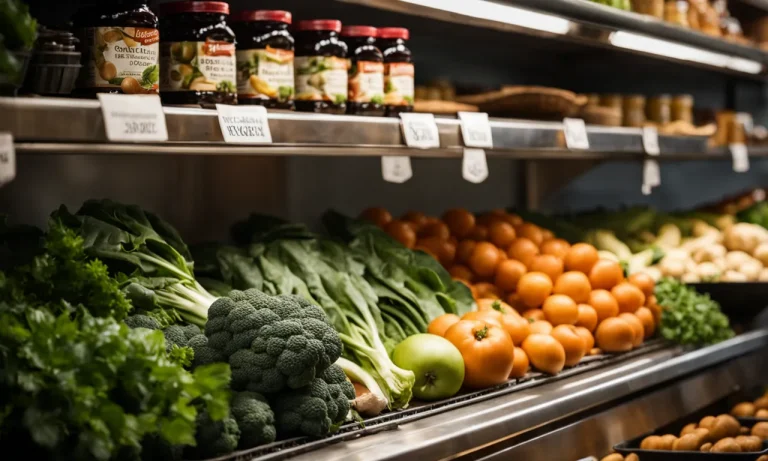Is It Cheaper To Be Vegetarian?
With rising food costs, many people are looking for ways to save money on their grocery bills. One option some consider is switching to a vegetarian diet, which eliminates expensive meat products. But is going vegetarian actually cheaper?
In this comprehensive guide, we’ll analyze the costs of vegetarianism versus a standard diet including meat to find out.
If you’re short on time, here’s a quick answer to your question: Going vegetarian can be cheaper than a standard diet, but it depends on your food choices. Sticking to basics like grains, beans, lentils, and seasonal produce will offer maximum savings.
The Potential Savings of Going Vegetarian
Meat is More Expensive Than Plant-Based Foods
One of the main reasons why it can be cheaper to be vegetarian is that meat is generally more expensive than plant-based foods. Meat production requires significant resources such as land, water, and feed for animals.
These costs are often passed on to consumers, making meat products more expensive at the grocery store. In contrast, plant-based foods like vegetables, grains, and legumes are more affordable and readily available.
By opting for a vegetarian diet, individuals can save money on their grocery bills without sacrificing nutrition or taste.
Eating Less Processed Food Helps
Another factor that contributes to the potential savings of going vegetarian is the reduction in processed food consumption. Processed foods often come with a higher price tag due to the added cost of manufacturing, packaging, and marketing.
Many vegetarian diets focus on whole foods, such as fruits, vegetables, and whole grains, which are typically less processed and more affordable. By choosing to eat less processed food, individuals can not only save money but also improve their overall health and well-being.
Buying in Bulk Reduces Costs
Buying in bulk is a strategy that can significantly reduce the cost of groceries for both vegetarians and non-vegetarians. However, it can be particularly advantageous for vegetarians since many staple plant-based foods have a longer shelf life.
Items like rice, beans, lentils, and pasta can be purchased in bulk and stored for an extended period without compromising their quality. This allows individuals to take advantage of bulk discounts and save money in the long run.
Moreover, buying in bulk also reduces packaging waste, making it an environmentally friendly choice.
Factors that Impact the Cost of a Vegetarian Diet
Eating More Convenience Foods Can Raise Costs
While it is true that a vegetarian diet can be more cost-effective than a meat-based diet, the cost can vary depending on the choices one makes. One factor that can impact the cost of a vegetarian diet is the consumption of convenience foods.
These pre-packaged vegetarian meals and snacks often come with a higher price tag compared to cooking from scratch. While they may offer convenience and save time, they can also add up and increase the overall cost of being vegetarian.
It is important to note that convenience foods are not necessarily unhealthy, but they may contain additives or preservatives that are not present in homemade meals. Therefore, opting for a balance between convenience and homemade meals can be a good way to manage costs while still enjoying the benefits of a vegetarian diet.
Choosing Premium Meat Substitutes Adds Up
Another factor that can impact the cost of a vegetarian diet is the choice of meat substitutes. While there are many affordable options available, such as tofu, lentils, and beans, some individuals may opt for premium meat substitutes that mimic the taste and texture of meat more closely.
These premium options, such as plant-based burgers or imitation seafood, can be more expensive than their basic counterparts.
While these premium meat substitutes can be a great addition to a vegetarian diet, they may not be necessary for everyone. It is important to find a balance between cost and taste preferences. Experimenting with different options and finding affordable alternatives can help maintain a budget-friendly vegetarian diet.
Eating Out Less Often Saves Money
One significant advantage of being vegetarian is that it often encourages individuals to cook at home more frequently. Eating out less often not only promotes healthier eating habits but can also save money.
Dining out regularly can quickly add up, especially when opting for vegetarian or vegan options at restaurants that cater to these dietary preferences.
By cooking meals at home, individuals have better control over the ingredients used and portion sizes. This can lead to significant savings in the long run. Additionally, cooking at home allows for more creativity and experimentation with different vegetarian recipes, making the dining experience more enjoyable and fulfilling.
Ways to Save Money on a Vegetarian Diet
Being vegetarian doesn’t have to break the bank. In fact, it can be a cost-effective way to eat healthy and delicious meals. Here are some tips to help you save money on a vegetarian diet:
Cook at Home Using Whole Foods
One of the best ways to save money on a vegetarian diet is to cook at home using whole foods. Whole foods, such as fruits, vegetables, whole grains, and legumes, are generally less expensive than processed foods.
You can buy these ingredients in bulk and use them to create a variety of nutritious and budget-friendly meals. Plus, cooking at home allows you to have control over the ingredients you use, helping you save money on expensive pre-packaged vegetarian products.
Plan Meals and Shop with a List
Meal planning is an essential strategy when it comes to saving money on any diet, including a vegetarian one. By planning your meals in advance, you can make a shopping list that includes only the items you need, preventing impulse purchases and reducing food waste.
When you shop with a list, you can also take advantage of sales and discounts, helping you save even more money. Additionally, planning meals allows you to buy ingredients in bulk, which can further reduce costs.
Buy Produce in Season
Buying produce in season is a great way to save money on a vegetarian diet. When fruits and vegetables are in season, they are more abundant and therefore cheaper. You can find a wide variety of seasonal produce at local farmers’ markets or grocery stores.
Not only will buying in-season produce save you money, but it will also ensure that you are getting the freshest and most flavorful ingredients for your meals. Plus, supporting local farmers is a great way to contribute to your community’s economy.
Conclusion
Switching to a vegetarian diet can lower grocery bills substantially if you choose economical plant-based staples like beans, lentils, and in-season produce. But vegetarian convenience foods and meat substitutes can reduce potential savings.
With meal planning and smart shopping, going veggie can squeeze more from your food budget.







